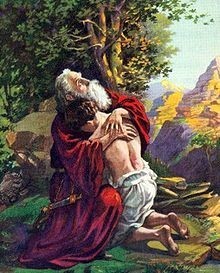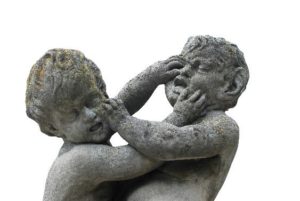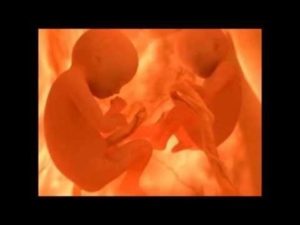In the New Testament we learn that the Old Testament history not only supplies us with a record of what happened historically, but that these incidents recorded in Scripture are for our practical benefit. They are written for our example and “for our instruction, upon whom the ends of the ages have come” (1 Corinthians 10:11).
“Now Abraham gave all that he had to Isaac.” (Genesis 25:5)
We have already seen how Abraham is a picture of God the Father who provides His only Son as the perfect substitutionary sacrifice (Genesis 22) on the mountains of Moriah (meaning ‘seen of God’; it is ‘center stage’ in the theater of redemption, the location of Golgotha, Mt. Calvary). In the very same geographical area hundreds of centuries later, God would provide Himself a sacrifice (the greater Isaac, Jesus Christ) so that we could receive the promised blessing of His deathless life, and a relationship with Himself throughout eternity. In Genesis 24 we see that the Father (Abraham) sends his messenger (the Holy Spirit) to get a bride (the church) for His Son (Christ). Now in Chapter 25 we see other aspects of the gospel reflected in these expositional constants.

The Father gives all that He has to His Son (Genesis 25:5). This is the first mention of inheritance. We see how beautifully this is seen in the gospel. Jesus said, “All things that the Father has are Mine.” (John 16:15a). And all that is Christ’s is made known to us and available to us by the Holy Spirit (John 16:15b).
In Christ we receive all that the Father has of an incorruptible inheritance (1 Peter 1:4). We are just moments away from receiving what is ours as spiritual billionaires with every spiritual blessing legally written over to us in Christ!
Another pattern emerges in the Book of Genesis- prophetic pictures of the first man and the second man; the flesh and the spirit. “The spiritual did not come first, but the natural, and after that, the spiritual” (1 Corinthians 15:46). We have prophetic pictures of this truth not only in Adam, the first man, and Christ, the second man’ (1 Cor 15:47), but in Cain and Abel, Ishmael and Isaac, Esau and Jacob, King Saul and King David, as well as others. God sets aside the first, that He might establish and bless the second (see Hebrews 10:9).
These examples of the first and the second become a picture of the flesh (all that humankind is apart from Christ) and the Spirit, the old man and the new, the old order and the new creation. Jesus said, “That which is born of the flesh is flesh; and that which is born of the Spirit, is spirit.” (John 3:6) “It is the Spirit who gives life; the flesh profits nothing;”
Galatians 5:17 (NASB)
For the flesh sets its desire against the Spirit, and the Spirit against the flesh; for these are in opposition to one another, so that you may not do the things that you please.

Cain, Ishmael, Esau, and Saul are pictures of the unregenerate, ‘natural’ man. We see them expressing a disregard for what is important to the Lord. Cain resented the righteousness that Abel received by grace through the obedience of faith, giving God what God required of an innocent animal substitute picturing Christ, the Lamb of God. Ishmael mocked Isaac, the promise given by God. We will see that Esau also will despise the birthright.
Whereas Ishmael pictures the natural man, the flesh, Isaac pictures those who were birthed through faith in the Promise. Isaac is a type of a person who has experienced conversion, one who is born by the power of God through faith in God’s Word. The Apostle Peter tells us that we who believe have been born of the incorruptible seed of the Word of God:
1 Peter 1:23 for you have been born again not of seed which is perishable but imperishable, that is, through the living and enduring word of God.
The Apostle Paul makes a similar analogy:
Galatians 4:28 And you brethren, like Isaac, are children of promise.
Warren Wiersbe says it well, “Ishmael was born a slave, but Isaac was born free. Ishmael was born poor, but Isaac was born rich. Every believer in Jesus Christ shares all the blessings of the Spirit in Christ and is part of Christ’s glorious inheritance.” (Ephesians 1:3, 11, 18; Bible Exposition Commentary (BE Series) – Old Testament – The Bible Exposition Commentary – Pentateuch)
WE HAVE A PICTURE OF THIS INWARD RIVALRY IN ISAAC’S SONS- ESAU and JACOB.
Learning patience is part of our God-given curriculum in the school of faith. Noah preached for 120 years without a convert. Abraham waited 25 years for Isaac to be born. Isaac and Rebekah waited 20 years for their children. Jacob had to labor for 7 years for his wife, only to get the wrong one and had to labor another 7 years. Joseph had to wait 20 years to be reconciled to his brothers. The Book of Genesis teaches us that it is important to be patient. God is not in a hurry. His timing is perfect.
Genesis 25:21 Isaac prayed to the LORD on behalf of his wife, because she was barren; and the LORD answered him and Rebekah his wife conceived.
Genesis 25:22 (NASB) But the children struggled together within her”
The twins within Rebekah’s womb, though twins, were rivals from the womb, whose descendants would also be rivals.

Genesis 25:23 (NASB) The LORD said to her, “Two nations are in your womb; And two peoples will be separated from your body; And one people shall be stronger than the other; And the older shall serve the younger.”
First there is the prophecy of the older serving the younger. Later in the chapter the older (Esau) sells his birthright to the younger (Jacob). The immediate gratification of having food in the belly meant more to him than a promised blessing that seemed less real, less relevant, and less beneficial in the moment (his inheritance) (Gen 25:33-34). (Big mistake there!)
THE NEW TESTAMENT READING: Matthew 8:18-34
Here are some tests for our discipleship:
Will we follow Christ unconditionally? Even if it means abandoning the comforts we are accustomed to? (Matt 8:20). Do we profess to be followers of Christ and yet insist on following on our own terms and in our own time?
Jesus says, “Follow me now!”
A “would be” follower of Christ might say, “wait until the ball game is finished; wait until I finish doing what I want to do or what I think I need to do.” Is that trusting Jesus?
TODAY’S READING IN THE BOOK OF PSALMS – PSALM 10
PSALM 10:1-15 In reading today’s Psalms you hear the Psalmist venting. His heart cries may not be in line with those of the Lord, but his heart cries are heard nevertheless and are welcomed by God. This should encourage us to express our frustrations and even our confusions to God! Then let Him sort you out!
TODAY’S READING IN THE BOOK OF PROVERBS – PROVERBS 3:7-8
Proverbs 3:7-8 Do not be wise in your own eyes; Fear the LORD and turn away from evil. It will be healing to your body and refreshment to your bones.
A little bit of humility can be healing!
PRAYER: Lord, may I never despise the things that You esteem as precious! Your Word is to be desired more than gold! Your word is to be esteemed more than my necessary food (Job 23:12)! May I never second guess the wisdom of the Cross, Your perfect solution for my salvation! May I never mock the Promise (like Ishmael), or despise the birthright (like Esau)! I thank You that my inheritance is in Christ and has been won for me by Christ! Keep me from rationalizing my disobedience. Help me to follow You even when it is not convenient. Teach me not to be afraid, by reminding me that You are with me, will never leave me, and are Lord of the storms! May I care more about people’s eternal souls and their being set free from the dominion of darkness than what’s for dinner, or how to keep my swineherds happy. Enlighten my understanding with a consciousness of Your Presence so that I will lose all appetite for evil.
Pastor David
